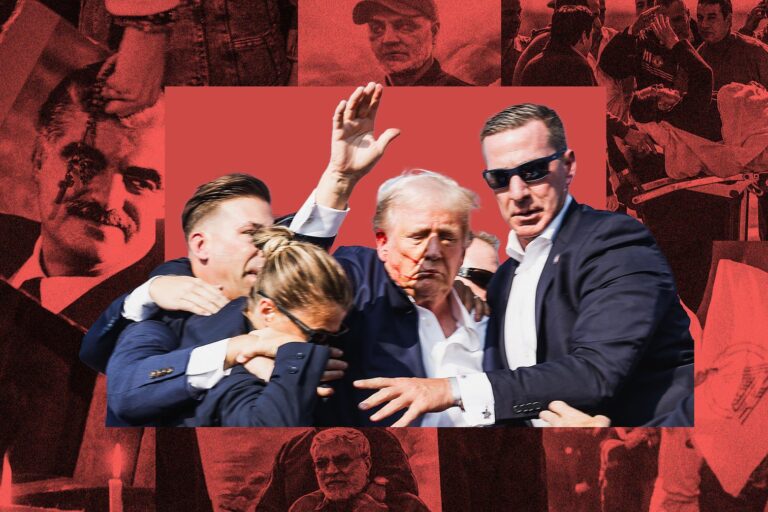Saturday’s assassination attempt on former President Donald Trump was horrifying. Trump remains as dangerous as ever, and the shooting has already fueled his galactic martyr complex and the cult of personality that has sprung up around him. He could theoretically try to unite the country at the Republican National Convention in Milwaukee this week. But we know he won’t, because his campaign — indeed his entire political career — is built on anger, fear, and confusion. He will almost certainly say again that only he can solve it, despite spending years expertly glorifying and joking about violence against his political opponents. Without confusion, he’s just an old showman.
But Trump’s unpleasant personality and pernicious impact on our politics do not justify attempts on his or anyone else’s life. Political violence erodes confidence in a key feature of democratic politics: our ability to resolve differences without resorting to killing each other. Every human society will have deep, perhaps unbridgeable, differences. The magic of democracy is not to resolve everything smoothly, but to create mechanisms that allow peaceful competition for power and seamless, routine transfer of authority between opposing parties and individuals. Democracy gives losers a vision of the future against which they can plan new electoral strategies. Constitutional rules bind these political forces together even when they have little else in common.
Political violence deliberately subverts this formula. By making large numbers of people anxious and terrified, it almost inevitably leads to calls for authoritarian measures to restore order. And like ordinary murder, political violence fuels a desire for retribution, setting off a cycle of revenge that causes even rational, well-intentioned people to lose perspective and support what they would have found abhorrent only recently. At a certain point, members of different communities come to feel safe only around each other, and to believe that safety can be achieved only by eliminating their opponents.
The problem is that democracy is hard, frustrating, and imperfect, whereas violence is quick and easy. Threatening democracy comes with virtually no cost. I have spent time in societies on the brink of upheaval, such as Syria before the civil war, Egypt just before the Arab Spring, and post-conflict Lebanon. In these places, any momentary calm was either illusory or maintained at gunpoint. In Bashar al-Assad’s Syria during the Iraq War, the mere mention of politics evoked eye-rolling terror. In Egypt, the heavy hand of coercion was wielded everywhere, and people had good reason to fear participating in what we would consider normal political activity. In these places, it had become nearly impossible to overthrow tyranny.
I remember seeing graffiti on a bathroom stall in Beirut in 2003 that read, “Die from natural causes.” It was a plea, not a threat. The audience was people who wandered into the bathroom, read the graffiti, and reflected on the trauma of vainly hoping for what should be the normal end of a full life. In 15 years, 150,000 people, mostly civilians, had died in Lebanon. That was about 5 percent of the pre-war population, and although the country was at peace on the surface, it had not fully recovered. The buildings that had survived the war were still riddled with bullet holes. People who had only recently been shooting at each other in a divided city were now trying to figure out how to share it again. No one had won the war. The whole society had lost.
The weak ties that bind individuals and groups in society are extremely difficult to repair once broken. Widespread intercommunal violence traumatizes generations of people who survive it, and each inhuman act makes it harder to restore the trust necessary for democratic political institutions to function. As Kirsten Dunst, the war correspondent, puts it in Alex Garland’s film: civil war“Every time I survived a battle, I felt like I was sending a warning home. Don’t do that.…But here we are.”
Here we are, right now. The United States lacks some obvious precursors to the kind of widespread political violence that would lead to a civil war. There are no large groups of rival militias vying for power in the streets or aspiring statehood. Despite talk of a second Civil War and cosplay separatists, there was no sustained violence between Democrats and Republicans, nor any meaningful threats between “red” and “blue” states. Few people really want to divide the country, and even fewer really want to fight each other in the streets.
But there are also worrying signs. In 2020, the United States failed to peacefully transfer power between political parties for the first time since the Civil War. The outgoing president incited a mob of enraged supporters who shared the delusion that the election was stolen, and then they stormed the U.S. Capitol, many of them hoping to harm lawmakers and disrupt the certification of the election. Several people died in the attack. The man who was the subject of Saturday’s assassination attempt refused to profess that he would accept the election results in 2016 and 2020, and refuses now. He makes common cause with other autocrats, wooing and flattering them, and apparently hoping to emulate them. He has convinced tens of millions of Republicans that the president is a conman who stole the 2020 election. He threatens, with words and actions, to further erode the country’s embattled democracy.
The American political system has completely failed to thwart this threat. Senate Republicans refused to convict Trump after a second impeachment, the judicial system ran like molasses, giving Trump and his allies time to regroup, and the Supreme Court shamefully blocked every conceivable avenue to hold him accountable. Those who want to avoid a Lebanon-like descent into chaos must now work together to finish the job the American political system failed to do, peacefully, at the ballot box, while upholding the core values of liberal democracy.
Anything else is insanity. And you really don’t want to experience that insanity. I will lead.

